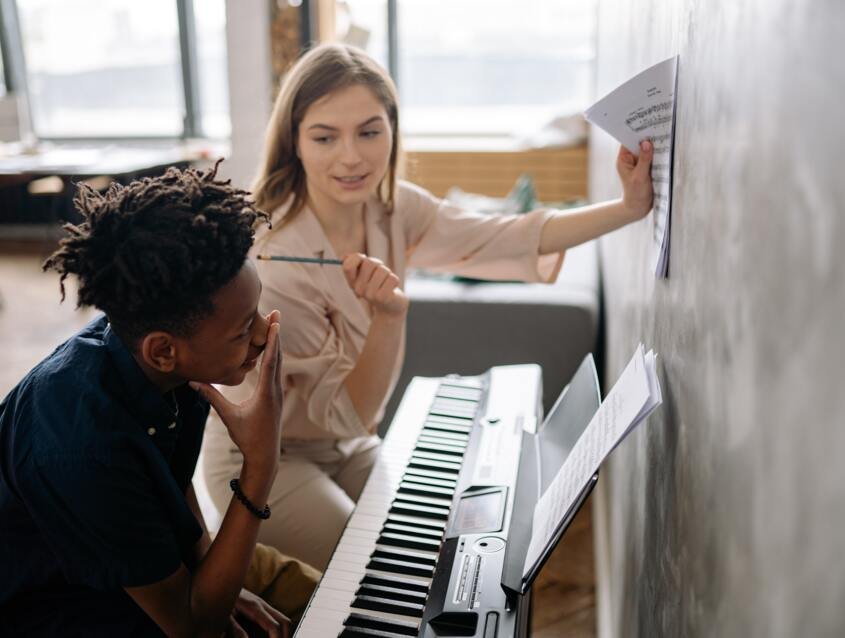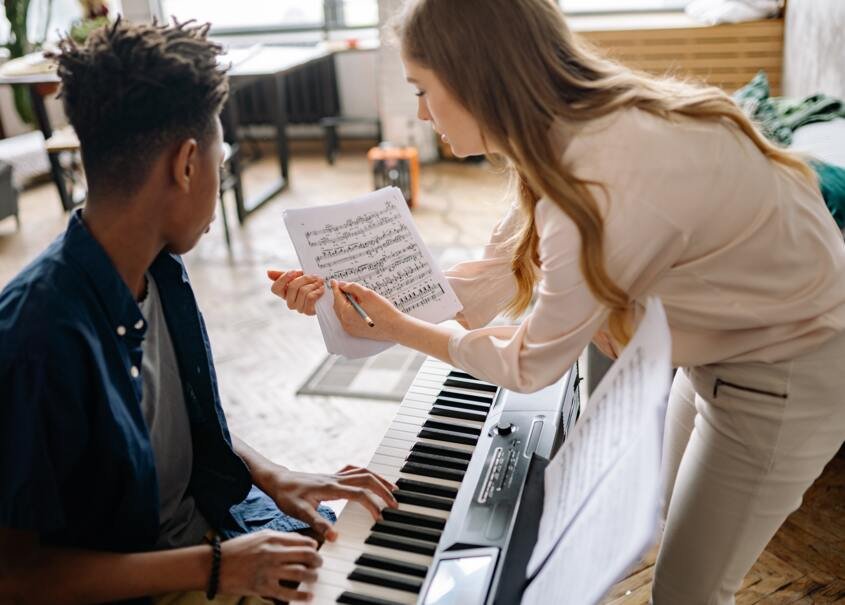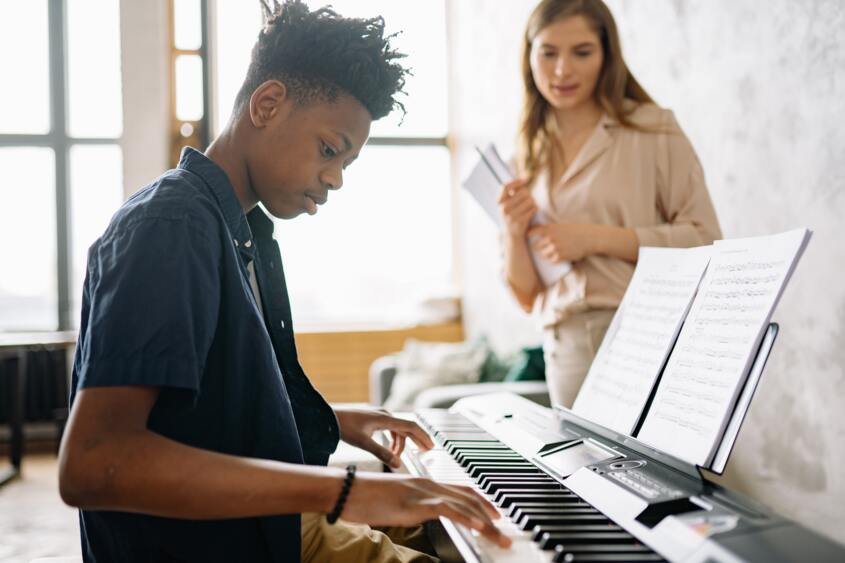Why Students Don’t Practice The Piano and The Aftermath
It is just so easy to decide that you want to learn a new instrument, but give up halfway through when the going gets tough. Learning a new instrument is no easy feat. It’s easy to imagine oneself as the real-life Arima Kousei and wanting to awe the world with your piano prodigy capabilities. However, the reality is far away from that.
In this article, we'll discuss why people tend to stop practicing the piano (or any other instrument, for that matter) and what you can do to avoid that.
Dropping out of piano-lessons
While it’s easy to fall in love with the instrument after listening to a piano piece on the radio or attending a piano concert, mastering a piano is no piece of cake. The piano is one of the most difficult instruments to master, and it can very well feel strenuous to hone your piano skills.
While you can not force someone into doing something they no longer feel enthusiastic about, you can identify and address the underlying issues causing them to feel that way. Read on to know what makes dozens of piano students drop out from their lessons.
Lack of Motivation
Every person has their own set of reasons that work as a driving force. Some are self-motivated, while others are influenced. While intrinsic motivation lasts, extrinsic motivation has its expiry date.
Validation from friends and family can go a long way and work as a good extrinsic motivation. When piano students practice the piano in front of their loved ones and get praised for it, it not only boosts their confidence but also encourages them to practice harder and play the piano better.
Time Consuming

Photo by Yan Krukov from Pexels
For progress, you need practice. That goes for any and every musical instrument out there. Any good piano instructor would suggest incorporating it within the daily routine. However, this can feel dreary for someone with a tightly packed schedule.
If you're a student, you'd have to juggle classes, school projects, assignments, and so on. As an adult, you'd have a job and a dozen other commitments. Amidst it all, making time for your piano practice can be quite a hassle.
Costly Tuition Fees
Becoming proficient at playing the piano takes a lot of time, effort, and sometimes quite a hefty sum of money, too. It is difficult to find a piano instructor who would not only meet your requirements but also fit your budget.
And that can often work as a discouraging factor for some students since not everyone can afford to pay the same.
Not Actualizing Latent Potential
It's important for piano students to understand what they really want. The most daunting part is finding a repertoire that motivates students to play. It's hardly ever fruitful to give students a piece they won't enjoy, regardless of how easy it is.
Encouraging the students to continue the practice
Mastering anything takes years of practice. While there are factors that can influence piano students to discontinue their practice, some initiatives can bring the magic that made them enthusiastic enough to start in the first place.
Keeping the Piano Within Sight
Practicing any musical instrument in a quiet environment has its benefits. Then again, sometimes keeping the piano in a separate room where there’s a lack of family activities can make the piano a lonely pursuit.
When you’re keeping the piano within reach, students will instinctively start playing it whenever they want. Setting up practice concerts for them can make the competitions feel less nerve-wracking.
We suggest placing a piano statue on a shelf where the little one is mostly looking. It could be in their playroom, living room, or kitchen. The psychology of this method is to remind them that they have the ability to play the instrument that is in front of their sight.
You can purchase one-off amazon with one-day shipping Click Here!
Finding A Repertoire
Finding a repertoire for piano students is perhaps the most critical aspect of staying motivated to learn the piano. As mentioned earlier, students need to 'feel' the music to really enjoy playing it.
One way to go about it is by exposing students to songs of different genres. Once they're hooked to something, it becomes way easier for them to learn it and even have fun while learning. This also means prioritizing what your student thinks and wants. While planning out music lessons, it is extremely important to assess what your students want from these lessons.
- Why are your students learning the piano?
- What is their ultimate objective?
- Is there a particular genre they're interested in learning?
- How can you help them reach that goal?
These are questions you need to ask yourself and your students to retain their interest in practicing the piano. With rare good quality music these days, it's already hard enough as is. But you need to let your students explore their interests rather than going for a full-fledged traditional approach. It's practically the first step to keep your students motivated throughout their learning journey.
Rather than having your students play each note by note, it is wiser to let them discover their repertoire on their own. The trick to ensuring this is to expose students to different genres and types of music from an early stage.
For this, the teacher also has to acknowledge what the student has to say or wants to voice out. It could be through a simple phrase or an ice-breaker session. Alongside exposing a broad range of music, learning how to play by ear is another effective method of teaching.
When trying to find a repertoire for a student, it is crucial to be in the process with them. This means the student and mentor need to share the experience of learning together to discover something incredible.
One easy way to take the process by the horns is to urge the learner to bring in a piece that he/she likes. The chosen piece doesn’t need to have any other kind of purpose in learning, other than the involvement of both learner and mentor. It’s possible to build a common ground between both parties through trust, sharing difficulty, and practice.
Ear Training
One of the most important aspects of teaching the piano to your students is ear training. Play a piece of music they like and suggest practicing a portion together. Keep playing it over and over while humming or singing it. Ask them to name the notes you played. Ask them how they felt about it or how easy/difficult it seemed. Consider asking them intuitive questions, i.e. 'What was the starting note?'
This way, students feel intrigued like they have a puzzle to solve. The clearer they hear the notes in their minds, the better they get at identifying them.
Making Piano Practice More Fun

Photo by Yan Krukov from Pexels
Learning the piano can simply become monotonous because you’re practicing the same notes for hours every day. It’s to keep the lessons interesting and challenging enough for the students to want to master.
You can introduce them to different piano apps or incorporate games with the practice sessions so they don’t lose interest. Engaging with your students or kids and making them not feel isolated can lessen the pressure and the practice would become natural.
This also means listening to what the students really want. Exposing students to versatile music increases their chances of finding something they genuinely enjoy. The teacher can then harness that interest and offer piano lessons related to that genre.
The Best Piano Teachers introduced lately the advanced and enjoyable method of learning to play the piano! Note speed is a fast, competitive, and hands-on card game for one or two players. Teaches notes from Low C to High C in seven sequential levels!
- Educating and entertaining
- Teaches the natural pattern of note reading
- Can be played individually or with a partner
- All 7 Levels are included in this set!
Enhance your teaching experience with the notespeed!
Incorporating Piano Practice in Daily Routine
It is said that the only way a student can enjoy playing the piano is through practice. The more a student practices, the better they understand the notes and keys. That does not, however, mean that students should practice the piano for hours at a stretch. This will only overwhelm them. Practicing for 20-30 minutes every day is good enough.
Letting Them Use Their Imagination

Photo by Yan Krukov from Pexels
Every artist seeks freedom of expression. Once it is ensured that the student knows how to practice, the student should be allowed to create their pieces from time to time. Let them evaluate themselves. This way, you’re giving them the authority to explore things their way.
They must understand the style they prefer the most, whether that's R&B, jazz, blues, classical, contemporary, or country.
Choosing the Right Teacher
The right teacher can make the most difference. Mastering the piano can be taxing, and it’s relatively harder to measure the improvement. The instructor can record the students and then play them later to show them how far they’ve come.
Let them choose the style of music they’re comfortable with and make sure they understand the notes. If finances are an issue, then the student can join combined classes. This way, they can also get acquainted with other piano students who share the same interest they do.
At The Best Piano Teachers, you find teachers who can assist you and/or your child/sibling in discovering their latent capability. There’s a range of features that you can use to find the instructor that meets your needs and budget and is the best fit for you.
Final Words
It is easy to fall in love with a piano tune, but it sure is difficult to master it yourself. Consequently, keeping students interested and engaged can be a little difficult. That being said, the key to continuing their piano practice is to understand what they want and being empathetic towards their needs.
As a parent, what steps do you think your child’s piano teacher is taking to keep them engaged?
